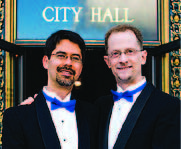 Subhi Nahas, an openly gay Syrian refugee from Idlib, a city north of Damascus, made history recently when he and a gay Iraqi refugee addressed the first ever meeting of the United Nations Security Council concerning the human rights of LGBT refugees.
Subhi Nahas, an openly gay Syrian refugee from Idlib, a city north of Damascus, made history recently when he and a gay Iraqi refugee addressed the first ever meeting of the United Nations Security Council concerning the human rights of LGBT refugees.
Nahas testified powerfully to the brutal treatment of LGBT people and those perceived to be gay in his country. He recounted the public executions of gay men after ISIL (also known as ISIS) gained control of many areas of Syria and Iraq in 2014. Nahas stated: “At the executions, hundreds of townspeople, including children, cheered jubilantly as at a wedding. If a victim did not die after being hurled off a building, the townspeople stoned him to death.”
Nahas made clear that being gay was not acceptable in pre-civil war Syria either. And after the civil war began in 2011, the Syrian government instituted a homophobic crackdown that included “systematic raids on locales where gay people met,” and arrests, torture, and, in some cases, death. Nahas described that when the Al Qaida affiliate Jabhat Al Nusra gained power in Idlib in 2012, “they announced at a mosque that they would cleanse the town of those involved in sodomy.”
Nahas “was terrified to go out,” but his home was not safe either. His father, who Nahas says “ridiculed how I dressed, how I talked, my mannerisms and how I walked,” violently attacked him, smashing his face into the kitchen counter after a heated argument. Soon thereafter, Nahas seized an opportunity to escape, but he recounted how he remained at risk during his long route through Lebanon and Turkey to eventual safety. In Turkey, ISIL operatives stalked him and threatened his life. There he became an out LGBT activist and connected to “ORAM,” the Organization for Refuge, Asylum, and Migration, with which he now works. Nahas recently moved to the United States and lives in San Francisco.
In the conclusion of his remarks to the United Nations Security Council, Nahas stated: “I implore you to do everything in your power to give sexual and gender minorities and other vulnerable refugees safe haven where they can again know security.” Nahas’ plea is universal. Same-sex intimacy is a crime in 79 countries, and in 12 countries may be punishable by death. The United States Supreme Court declared criminalization of same-sex intimacy in America unconstitutional just 12 years ago in 2003, and unfortunately many LGBT Americans still live under threat for their safety. Our collective mission must be for LGBT people to feel secure in their own homes, wherever they live in America or around the world.
United States U.N. Ambassador Samantha Power, who hosted the recent U.N. Security Council meeting along with Chile’s U.N. Ambassador Cristian Barros Melet, articulated that vision: “While ISIL’s horrors rightly get our attention and bring us into this historic meeting…it’s also important that we not focus all of our outrage on ISIL and forget about the injustices and abuses that exist elsewhere, sometimes even perpetuated by governments. ISIL is an extreme form of horror, but there are gay people around the world who are living with a great fear of violence in places where ISIL doesn’t exist, and we need to focus our attention on their welfare, their physical security, and their rights every bit as much.”
Through his courageous presence, his testimony to the truth of his life, and his activism, Subhi Nahas stands with thousands of other LGBT people around the world in devoting their lives to making the world a better place for all of us. U.N. Ambassadors Power and Melet, along with many other people, are powerful allies and advocates. In our next column, we will focus on the current head of the United Nations, Secretary-General Ban Ki-Moon, who has emerged as an outspoken leader for LGBT equality worldwide. In standing up to the rejection, discrimination, and violence that LGBT individuals face in many places around the world, these people, along with this summer’s marriage equality victory in the U.S., give us hope as to what may be possible when we stand proud.
John Lewis and Stuart Gaffney, together for three decades, were plaintiffs in the California case for equal marriage rights decided by the California Supreme Court in 2008. They are leaders in the nationwide grassroots organization Marriage Equality USA.
Making History at the U.N.
Recent Comments